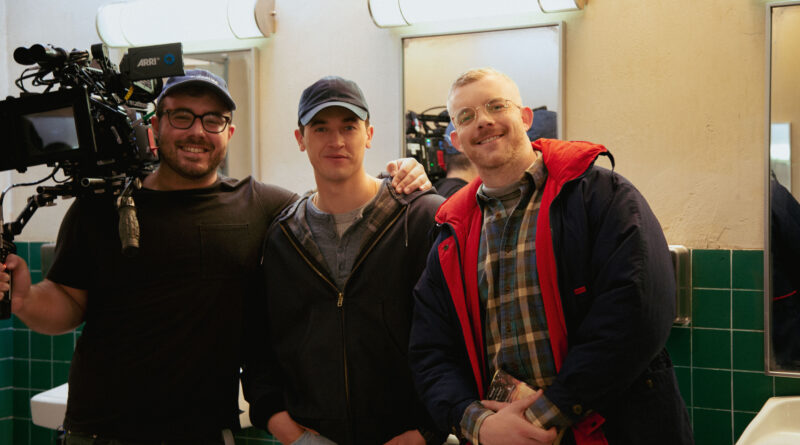Carmen Emmi on Plainclothes, Queer Storytelling, and the Power of Coming Home
By Cesar A Reyes
Carmen Emmi didn’t grow up dreaming of making movies. Raised in a traditional farming family in Syracuse, New York, he laughs that he didn’t have “the greenest of thumbs.” While his father and uncles worked the fields, Carmen spent more time exploring town and bonding with his grandparents. “I was the oldest grandchild, and I think my papa quickly realized I wasn’t meant to be in the fields,” he says. “I mostly just got to hang out with him and explore Syracuse, which I don’t take for granted.”
That connection to home shaped his debut feature film, Plainclothes, which he chose to shoot in Syracuse. “Being around my grandparents was, and still is, such a gift,” he says. “My papa didn’t get to see the film, but I dedicated it to him. My Nana and grandma are still here, and that kind of closeness means everything to me.”
Carmen’s early creative dream was to act—he grew up loving The Wizard of Oz and The Sound of Music. But behind the camera is where he ultimately found his voice. That discovery led to Plainclothes, a story set in 1997 about an undercover cop assigned to arrest men cruising in a public restroom. Things get complicated when he falls for one of them. “It’s a film about what it feels like to police your own feelings,” Carmen says. “And the kind of mind-altering state that can come from living that way.”
The idea for the film began in 2016, not long after Carmen came out. He’d read an article in the LA Times about a sting operation in Long Beach where police went undercover to arrest men for indecent exposure. “I had told myself it was safe to be who I was, and then I read this, and it suddenly didn’t feel safe anymore,” he says. Around the same time, his brother was becoming a police officer, adding a layer of personal complexity to the story. “I’m very close to him. As he got deeper into training, I learned more about what that world was like.”
Writing Plainclothes was a way to process those feelings. “I spent so many years trying to stay safe—being funny, being agreeable—before anyone could ask about who I really was,” he says. “When I learned about those sting operations, all of that came rushing back. I started journaling, and that’s how the character of Lucas was born.”
Carmen cast Tom Blyth and Russell Tovey in the lead roles, working with Bernie Telsey and team. “Russell is a legend to me,” he says. “Watching Looking helped me see a future for myself. And Tom brought such care and depth to Lucas. I’ll always be grateful for that.”
The film’s emotional tone was shaped by its late-’90s setting and its music. “Music is how I stay emotionally grounded. I played it on set to help actors drop into character,” he says. Composer Emily Wells created the score, blending new work with older tracks that echoed Lucas’s emotional journey. Composer Lorne Balfe also mentored Carmen and Wells during post.
The project came together through deep personal ties. Carmen’s college roommate, Alessandra Ford-Balazs—who also appears in the film—introduced him to producer Arthur Landon. Another longtime friend, Vanessa Pantley, came on board as producer. “This was an indie film built on trust,” he says.
For Carmen, the experience of making Plainclothes was more than a career milestone. “I feel incredibly lucky that everything I wanted to say is on the screen,” he says. “That kind of experience is rare.”
As for what’s next? Carmen smiles. “I really want to learn how to fly a plane.”
Maybe that makes perfect sense. Plainclothes isn’t just a film about secrecy and shame—it’s about learning to lift off.


Pingback: Plainclothes — Carmen Emmi [Review] | In Review Online